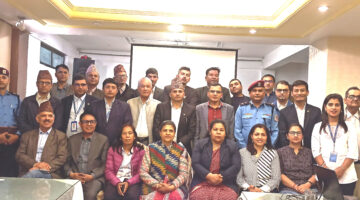Taranath Dahal
Currently, Nepal’s federal parliament is conducting a winter session. This session is also called a bill session. The winter session is expected to bring the laws awaited for long. However, political wrangling among the ruling partiers which surfaced again in the very beginning of this session resulting into the change in parties in the ruling coalition. It has cast doubt over the smooth functioning of the parliament to forward various bills related to implementation of federalism, and media and technology.
It has been almost eight years the country got new constitution, thereby institutionalizing the federal democratic republic. The present governments at all three tiers- local, provincial and federal- are running in second year following the second election held after promulgation of new constitution in 2015. But protracted formulation and enactment of laws has badly delayed the implementation of federalism. We have been watching continuously over the legislative business and unfolding developments on freedom of expression, right to information, right to communications and information technology and advocating for FoE friendly laws in the wake of revolution in IT and its impacts in society, especially on information and media ecosystem. Collaboration with line agencies to share knowledge and exchange views is also continued to foster atmosphere for free expression and its legal and institutional protection and promotion. But it is worrying that the changes in this sector are yet to be ensured and institutionalized.
The present session of the parliament needs to ensure existing Press Council Nepal as an autonomous media content regulator by augmenting it as a Media Council. For it to happen, the Media Council Bill should be forwarded for deliberation. It is awaited. Similarly, Public Service Broadcasting Bill has also been under consideration at a committee under the House of Representatives. We wish the passage of this bill from this very bill session of the parliament. A national mass communications bill mandated with autonomous regulatory authority on print, broadcasting and online had to enter the parliament, but is still at the Ministry of Communications and Information Technology. It is confusing whether Ministry is not able to forward or does not want to ward. It is however a pressing need to have an umbrella law on managing media sector. With the making of this law, old laws need to be scrapped so that conducive atmosphere would be created for professional, independent, and free media.
Moreover, either an integrated or sectoral law for the information technology sector has been felt long. The IT Bill which was under discussion in parliament for five years was rendered irrelevant before the second general election, while government has not tabled new bill on it in the parliament. The line ministry has recently made public the draft bill on IT and Cyber Security. It has mentioned the issues as cyber security, cyber crime, personal data protection and AI. However, the draft bill is problematic. It is discouraging to innovative IT use and control-oriented. Freedom Forum is studying minutely on it. It is urgent to pass it while comprehensive discussion is equally imperative. For the social networking sites, government had prepared separate draft bill, which is also worrying in terms of FoE, right to information and privacy, and civil space.
Therefore, it is time again for the civil society, private entities, researchers and all other stakeholders to work together and dwell on the pressing issues surrounding IT and free expression. Freedom Forum has close watch on such development and pressing from its sides so that wrong laws would not be made. Democracy will be threatened by the wrong laws. Rule by law is unacceptable, but rule of law. So, efforts will be continued to create atmosphere where democracy would thrive and citizens enjoy their rights unobstructed.


